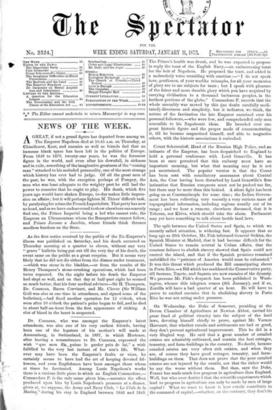Dr. Conneau, who was amongst the Emperor's latest attendants, was
also one of his very earliest friends, having been one of the legatees of his mother's will made at Arenemberg, in Switzerland, in 1837, in which Hortense, after leaving a remembrance to Dr. Conneau, expressed the wish " que mon fila.,,puisse le garder pres de lui," a wish fulfilled to the very last instant of her son's life. What- ever may have been the Emperor's faults or vices, he certainly seems to have had the art of keeping devoted fol- lowers, and even Englishmen have been amongst those whom at times he fascinated. Among Louis Napoleon's works there is a curious little piece in which an English Commodore,— Commodore P. is the only name given him,—narrates the effect produced upon him by Louis Napoleon's presence at a dinner, given at, we suppose, the Army and Navy Club, " Le Club de la
The Prince's health was drunk, and he was expected to propose in reply the toast of the English Navy, an embarrassing toast for the heir of Napoleon. He proposed the toast, and added in a melancholy voice trembling with emotion :—" I do not speak here, gentlemen, of your warlike triumphs, for all your memories of glory are to me subjects for tears ; but I speak with pleasure of the fairer and more durable glory which you have acquired by carrying civilisation to a thousand barbarous peoples, in the farthest portions of the globe." Commodore P. records that the whole assembly was moved by this (no doubt carefully medi- tated) directness and simplicity, but it indicates, we think, the nature of the fascination the late Emperor exercised over his personal followers,—who were few, and comprehended only men accessible to his Napoleonic ideas. He brooded over one great historic figure and the proper mode of commemorating it, till he became magnetised himself, and able to magnetise others, with the historic associations it embodied.


































